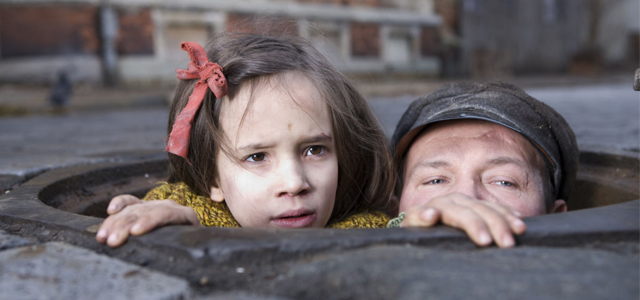(MA) Roadshow DVD/BD/digital download
This superb film rivets attention from its opening sequence. In between a burglary job and returning home to his wife, petty thief and sewer worker Leopold Socha sees a group of terrified, naked women being chased through a forest and murdered by German soldiers in Nazi-occupiedPoland.
Shortly afterwards, as the Nazis “liquidate” the Lvov Ghetto, Socha and a fellow sewer worker discover a diverse group of Jews attempting to hide in the city’s underground sewers.
Socha agrees to use his knowledge of the sewer system to help them — for a fee. But as months pass and the Jews struggle to survive in the stinking, rat-infested sewers, Socha’s courageous altruism gradually emerges and he becomes their protector.
In Darkness is based on a true story and honours this in its refusal to resort to simplistic perspectives. The narrative is full of irony: the apparently unavoidable killing of a German soldier results in the retaliatory murder of scores of innocents; a man’s heroic incursion into a nearby concentration camp results in the random slaughter of an unlucky bystander.
The film creates a compelling sense of the hellish, claustrophobic labyrinth within which Socha’s Jews survived for over a year. Extraordinarily powerful photography based on dark/light contrast generates a hallucinatory quality: fragments emerge from the dark with almost unbearable poignancy and intensity — a clenched hand, a face contorted in anguish, a child sharing a scrap of food or calmly moving a rat out of her way.
Above ground in the ravaged city there is another hell of suffering and cruelty visually represented by bleak, snowy scenes whose icy whiteness contrasts with the darkness below.
The writing and acting are impeccable: so skilful that they become transparent and the harrowing emotional experience of the film is direct and all-consuming.
Robert Wieckiewicz is excellent as Socha, his heavy-featured face expressive and at moments dazed by a terrible, costly love that seems to grow almost against his will.
A further strength of the film is its rhythmic structure, which moves from periods of strange, lulling acclimatised life in the sewers to climaxes of nerve-wracking suspense as Socha and his Jews come excruciatingly close to discovery.
The religious dimension here is subtle and indeterminate. Characters in the film derive comfort from religious practice: one of the Jews in the sewers prays regularly; Socha and his wife are Catholic. There is also an exquisitely shot and deeply troubling scene in which Socha’s young daughter makes her first communion — in the cathedral above which the Jews are struggling to survive.
Ultimately there is little doubt that any real communion with God is happening in the courageous love which dares to venture into the filth and horror below.
The film concludes with text which outlines the fate of the sewer-dwelling Jews and Socha, who was posthumously recognised byIsraelas a Righteous Among the Nations.
Apparently after Socha’s tragic and untimely death in 1946, someone at the funeral made the appalling claim that “God was punishing him for helping the Jews”. At its conclusion, In Darkness refutes this in a single sentence — and it’s difficult to read it without weeping.
Katrina Samaras













